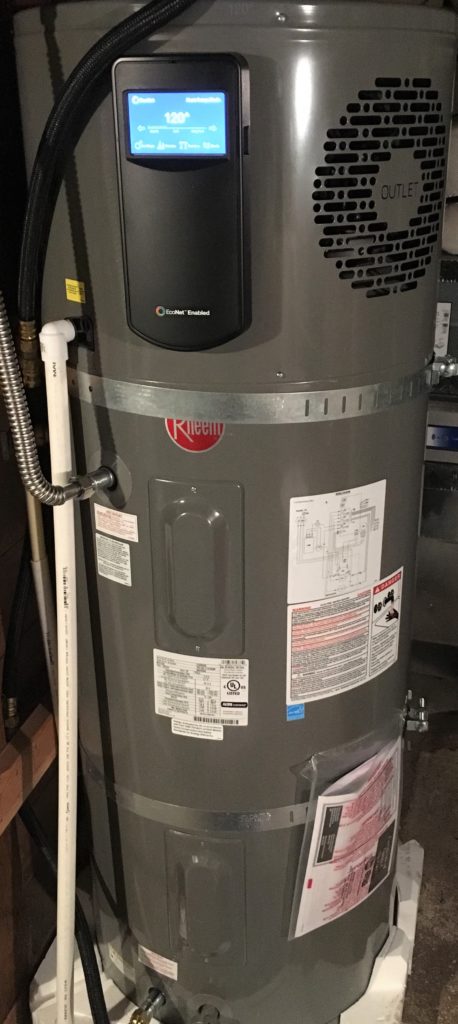Clothes washer, shower, kitchen sink. These are the places where hot water lives. In fact, water heating accounts for a large share of energy use in buildings—up to 32% in single-family and multifamily homes. Today, the U.S. Department of Energy announced its support of a new nationwide campaign to drastically cut carbon emissions and energy use from heating water with advanced heat pump technology. The Advanced Water Heating Initiative (AWHI) will work nationally to drive increased manufacturing, sales, installations, and operation of heat pump water heaters (HPWHs) across the United States. HPWHs are game-changing products that are two to four times more efficient than conventional options.

Heat pumps generally last for 12-14 years, which means that by 2035 all water heaters currently in use will likely need to be replaced. By choosing cleaner, more energy efficient HPWHs, U.S. households would save nearly 100 million tons of carbon emissions every year. The AWHI is working to realize this savings by growing market share of HPWHs effectively cutting carbon emissions that are fueling climate change. In addition to the carbon savings, transforming the water heater market in favor of heat pumps would save a significant amount of energy—enough to power 25 million homes each year. The AWHI is a collaboration of building industry entities, including utilities, state and local governments, efficiency programs, manufacturers, wholesalers, retailers, installers, and building industry professionals who are coordinating on policies, driving demand, and educating the supply chain.
“We are looking to phase out inefficient water heating products and replace them with clean, efficient heat pump models over the next 10 years,” said Smita Gupta, Director of Building Innovation at New Buildings Institute (NBI). “The carbon savings potential of a transformation of the heat pump water heaters is about 10% of building sector emissions, and that’s just for buying a product you would have to buy anyway with water heater replacements. In larger multifamily buildings, owners can install central heat pump systems that supply units with hot water that supports better health and well-being for everyone,” Gupta said.
Central to the AWHI is that the benefits of heat pump water heaters are delivered equitably to all households regardless of zip code. The transition to HPWHs also means training opportunities and job creation for installers and other workers along the supply chain. This transition is already happening on the West Coast where a regional version of the AWHI effort has been in place since 2019 when it was launched by NBI and the Building Decarbonization Coalition. In the Pacific Northwest, the City of Seattle and the Seattle Housing Authority (SHA) are partnering to ensure that affordable housing properties are included. A new project, slated for later this year, will transition an existing system to Mitsubishi’s new commercial heat pump water heating technology. These products have low global warming potential (GWP) refrigerants to ensure minimal impact to the environment and promote a healthy grid with demand response capabilities.
The project at SHA’s Bayview Tower will install a redundant heat pump system to the current electric resistance equipment to test the new product. The field test will serve more than 100 units at the property, which is home to some of the 38,000 low-income residents served by SHA, which owns and manages about 8,500 units of subsidized housing in the city. Its mission of providing safe, decent and affordable housing includes a commitment of environmental stewardship, according to Bobby Coleman, administrator of SHA’s Environmental Stewardship and Sustainability Division.
“The test of the new Mitsubishi product offers the chance for us to continue to provide hot water for our tenants while increasing efficiency two to four times over what we would see with a conventional product,” Coleman said. “We don’t always have the luxury of creating a parallel system to try out new technology. We are excited about the opportunity and the potential for it to be a scalable model for our other properties,” he said.
Bayview Tower is only the start. New amendments to Seattle’s energy code will promote widespread adoption of advanced water heating technologies in all new construction. “Bold policy choices, like our new energy code, are essential to meaningful climate action,” said Emily Alvarado, Director of the Seattle Office of Housing.
HPWHs use electricity to move heat from one place to another, like a refrigerator in reverse. An additional benefit of HPWHs is that they offer grid connectivity for demand response, meaning the equipment can communicate with the electric grid to manage energy use and shift the times it uses energy to periods during the day when demand (and the carbon intensity of the grid) is lower.
Heat pump water heater technology offers many benefits, but there are barriers to widespread adoption that AWHI is working to overcome. While the technology is cheaper to install in new all-electric construction projects, there can be a higher first cost in existing buildings. And, as with commercializing all technologies, there is lower consumer awareness about the benefits of these products, lack of installer experience, and a patchwork of uncoordinated programs and policies around the country. Addressing these barriers requires AWHI’s national efforts to set standards, coordinate policies, reduce costs, increase demand, and educate the supply chain.
“With the number of wildfires and serious storms growing every year, we cannot afford to wait. AWHI lands at a critical juncture of our climate change and economic recovery challenges,” said California Energy Commissioner Andrew McAllister. “Not only can we help decarbonize buildings with heat pump water heaters, but we will also help develop a U.S. workforce to manufacture and install these products, creating good paying jobs to get it done.”
About the Advanced Water Heating Initiative
The Advanced Water Heating Initiative (AWHI) is working to transform the water heater market and install clean, energy-efficient heat pump water heaters in all buildings across the United States. Through this effort, AWHI aims to help state and local governments meet decarbonization goals, create well-paying jobs, and invest in underserved communities. AWHI is a collaboration of utilities, federal agencies, state and local governments, manufacturers, installers, advocates, researchers, and building industry professionals. We are nationally supported, locally run and supported by partners and participants. To learn more, visit: www.advancedwaterheatinginitiative.org
AWHI is a member-funded program managed and administered by New Buildings Institute. The work of the initiative is not possible without the contributions and support of our volunteers, partners, and participating organizations.
Resources
Advanced Water Heating Initiative: advancedwaterheatinginitiative.org
Washington Post: Biden administration to announce new Energy Star standards, develop emissions targets for federal buildings
Office of Energy Efficiency & Renewable Energy Energy: Emissions and Equity (E3) Initiative
by Stacey Hobart, Communications Director
Did you enjoy this content? Consider supporting NBI’s work with a donation today.

